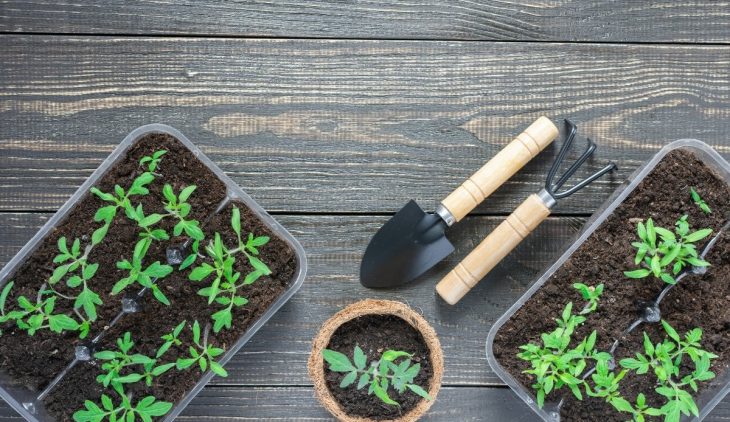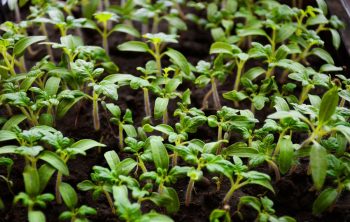Various plants have different pH levels they favor. Some plants thrive well in acidic
If you are a gardener and you wish to be successful in your planting endeavors, you need to be enlightened on the necessary
Soil pH is one essential growing requirement and the growing requirement for different plants varies. So, in this article, we will be focusing on the tomato plant.
The pH level of the tomato plant is one important factor to consider when aiming for successful tomato growth. So, let’s get to know if tomatoes do like acidic or alkaline
Are Tomatoes Acid Loving Plants?
Now let’s find out if tomatoes plants do like acidic soil. Ideally, tomato plants will flourish in slightly acidic
Therefore, when considering growing tomatoes in your garden, ensure you check the pH
So, let’s dive in further and look into the ideal pH range of the tomato plant.

PH Level For Tomatoes: What Is The Appropriate Range?
Now we know tomatoes do like acidic
Therefore, the appropriate
So, supplying your tomato plants with the appropriate pH levels will offer you a healthy tomato plant as well as a great harvest.
How Do You Acidify Soil For Tomatoes: Useful Tips To Adjust Soil PH
The right
This is why you need to create ideal growing environments or conditions for your tomatoes. Amending your
-
-
The first thing you should do before amending your soil to suit the tomato growing need is to test the
soil . Know the current pH range or status of your gardensoil and adjust accordingly.
-
Once you know the status of your, then you can proceed to either raise the
So, if you have decided to grow tomatoes in your garden and you wish to know to adjust (lower or raise
1. Soil Amendments For Raising Soil pH
Raising your garden
-
-
Limestone: Limestone is also known as calcium carbonate and it can be found in antacids tablets and chalks. The addition of limestone raises the
soil pH. Additionally, limestone will also supply calcium to your plants. -
Wood ash: The addition of wood ash will help increase the
soil pH in the garden. Just like limestone, wood ash will also provide calcium as an added bonus to your plant. -
Dolomitic Lime: Dolomitic lime is also similar to limestone and it will help raise the
soil pH level. This amendment is rich in magnesium and calcium. Therefore, it will provide both calcium and magnesium to your tomato plants. -
Calcium Sources: Sources of calcium will also help increase the
soil pH level. Calcium sources include eggshells, bone meal, and clamshells. These amendments tend to work better and faster if they are ground into fine powder.
-
Organics 09365 Additive De-Acidifier, 6 lb, Lime Soil
2. Soil Amendments For Lowering Soil pH
So, for
-
-
Sulfur: Sulfur is an element that helps decrease
soil pH range. But this amendment works gradually and it can take months for it to take full effect. Sulfur is also an essential nutrient required by your plant. Therefore, sulfur addition will help prevent the deficiency of sulfur. -
Sulfates: Amendments such as iron sulfate or aluminum sulfate both assist in decreasing the
soil pH. Sulfates work faster compared to elemental sulfur. But take note and be careful not to use too much so you don’t have excessive aluminum or iron in your gardensoil . -
Ammonium-based fertilizer: Ammonium-based fertilizer that includes ammonium sulfate and ammonium nitrate is great to lower
soil pH faster. However, these fertilizers have fast action that they may burn your plant if used inappropriately. Therefore, ensure you use the right dose.
-
Why It Pays For Your Tomato Soil To Be Acidic
Here are some benefits of supplying acidic pH to your tomato plants:
-
-
The tomato plant thrives well in an acidic environment.
-
You enjoy a healthier tomato plant and a better yield.
-
Nutrients can be well assimilated or absorbed from the
soil with the right pH range. Therefore, the necessary nutrients required by your tomato plant become available for proper growth.
-

FAQ’s
Do tomatoes prefer acidic or alkaline soils?
The pH of soil has a lot to do with the amount of fruit produced, but so does how much water is available to the plant.
Tomatoes like acidic soil. They also like lots of water. Soil that has lots of clay tends to be dry.
Too much acidity and your plants will develop blossom-end rot (BEN), which is a fungal infection that can cause your tomato plants to rot at the blossom end.
If you live in a cool area with a high humidity and you grow your tomatoes in a raised bed, you should add lime to the soil. The acidity of the soil will be too low, which will lead to blossom end rot. You should also add more organic matter and compost if the soil is already very acidic.
What’s the best pH for tomatoes?
When it comes to growing tomatoes, there are a number of things that you need to consider. One of these is the soil pH. The pH of your soil will have a great impact on the growth and development of your tomatoes.The best pH for tomatoes is between 5.5 and 7.5.
If you are growing your tomato plants in a pot, then you can easily adjust the pH of your soil by adding some lime or sulfur. But if you are growing them in the ground, then it’s a little bit more difficult.
What does lime do to soil?
Lime is a naturally occurring chemical that is found in the soil. Lime is one of the few soil amendments that can increase the pH of soil. It does this by making calcium ions and hydrogen ions more available in the soil, which makes them easier for plants to absorb.
What is the fastest way to lower pH in soil?
The fastest way to lower soil pH is by using lime. The amount of lime you need will depend on the existing pH and soil conditions, but typically I would suggest a 1/2 or 3/4 ratio of lime to soil.
How do I make sure that the soil is ready for my tomatoes?
You could do a test with a soil test kit. If you are using fertilizer, then you'll want to test for nutrients such as Nitrogen, Phosphorus, Potassium, Calcium, Magnesium, Sulphur, and Iron. The kit will tell you what needs to be added. If you have no soil amendments, then you can try adding compost and see how it affects the soil. If it doesn't improve the soil, then maybe you'll need to get a soil amendment. I'd go with some sort of soil amendment. You don't want to make the soil too acidic or too alkaline. If the soil is too acidic, then you can add lime or dolomite to raise the pH.
Do Tomatoes Like Acidic Soil : Final Say
We have seen that tomatoes plants do like acidic
Some

Eunice is an enthusiastic gardener with a passion for growing beautiful flowers. She loves nothing more than spending time in her garden, tending to her plants and enjoying the outdoors. Eunice has been gardening for over 15 years and has developed a unique style of landscaping that is both practical and aesthetically pleasing. She is especially fond of growing roses and enjoys experimenting with different varieties and colors. Eunice takes great pride in her garden and often shares the fruits of her labor with friends and family. In her spare time, she enjoys reading gardening magazines and attending local horticulture events. Eunice is passionate about her hobby and is always eager to share her knowledge and experience with others.





